How to build an on-demand food delivery app like Swiggy
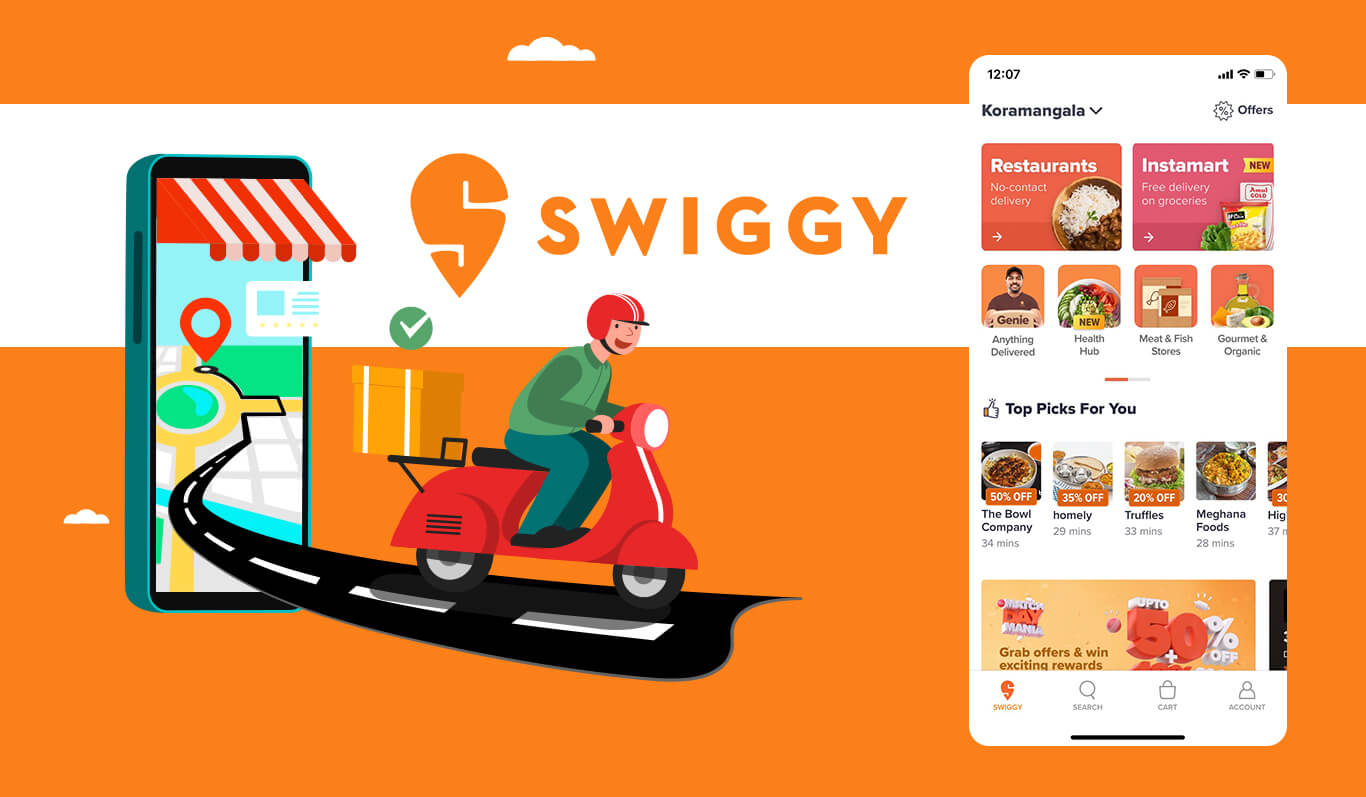
Food delivery apps like Swiggy are the need of the hour. Especially in recent times, on-demand food delivery apps have seen an increase in demand from customers who are working from home. Food delivery apps aren't just a blessing in disguise for the customers but are also a great boon to the business owners. If not for apps like Swiggy, most businesses would have been shut down.
By developing food delivery apps like Swiggy you connect customers to restaurants and food outlets, ensuring a premium quality of delivery within a specified time duration.
The beginning
Swiggy began its operations in 2014 using an easy-to-use simple interface. Nandan Reddy, Rahul Jaimini, and Sriharsha Majety developed an online food delivery platform that allows restaurants in your vicinity to display their menus so that users can place orders and get food delivered within 30 to 40 minutes. The app made it possible for the user to track their order in real-time.
Swiggy services were soon accepted by people all over Bengaluru, Mumbai, Hyderabad, Chennai, Delhi, Kolkata, and Pune, which led to its use expanding beyond these cities.
What makes online food delivery apps so popular?
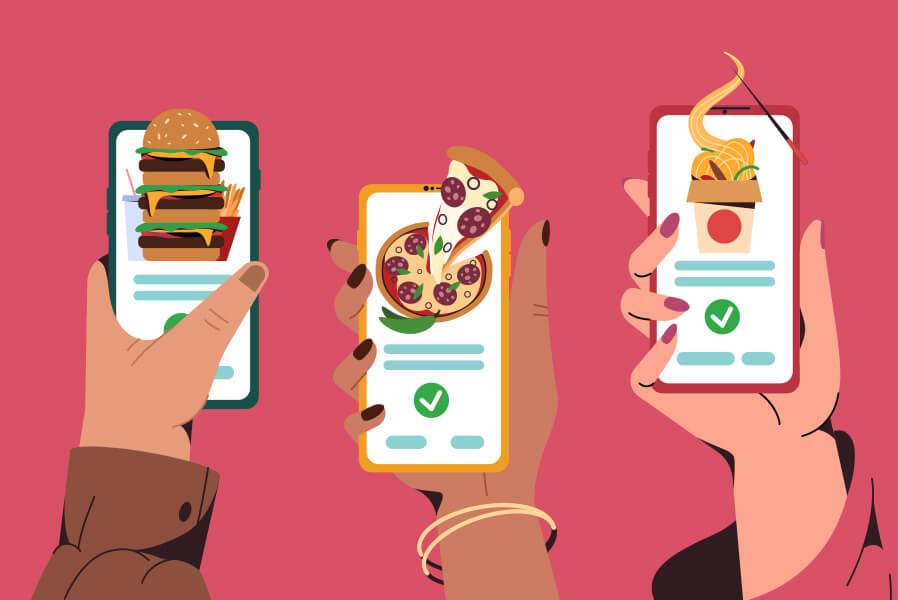
No one has time to spend standing in long lines waiting for food, reserving tables, or reading menus in today's fast-paced world. The most convenient way to get what they want is to order through a delivery app online. Hence most working people or people with busy schedules, students, bachelors, and even those who are too lazy to cook a meal are attracted to apps like Swiggy.
There are a couple of factors that make Swiggy attractive to people. For example,
- Short delivery time
- Doorstep delivery
- Multiple payment options
- Various discounts and offers
- Variety of options
- Delivery tracking
- User reviews and ratings
These features encourage users to utilize the services of Swiggy as it provides ultimate convenience to the user.
Let us look at some of these in detail.
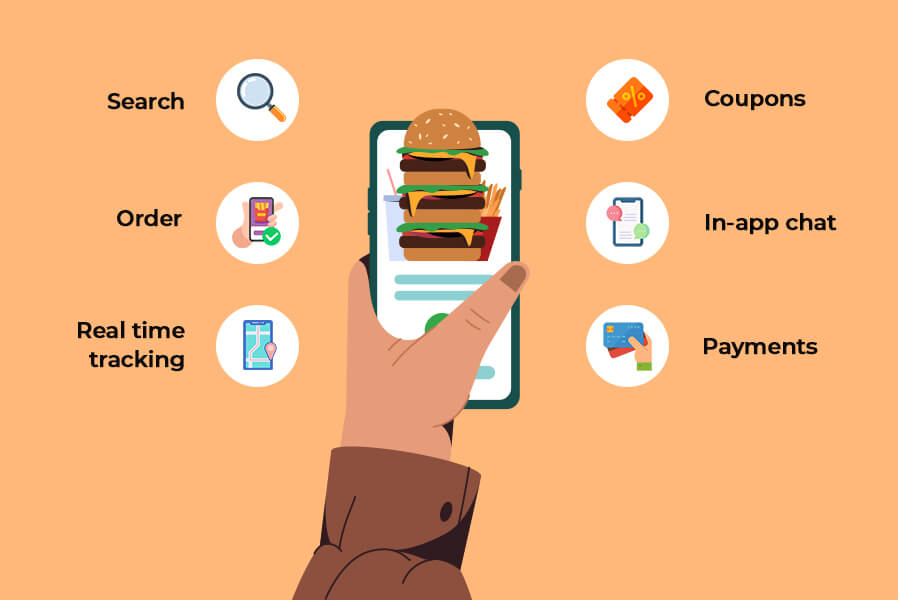
An attractive and easy-to-use interface
A food delivery app is an accessible replica of your favourite restaurant right from your mobile. Swiggy provides an interface that anyone would find easy to understand and quickly access what they want. By not providing a simple interface you could lose customers to your competitors. Simplicity is at the core of Swiggy design.
Access to data
A food delivery app's most important feature is data. You need to ensure that your app has access to all the information users need, such as menus, operating hours, and restaurant locations. The user can order their food effortlessly and positively engage with the app.
Payment options
Online food delivery apps provide a variety of ways to pay. This is one of their most attractive features. A greater number of payment options can make the user more willing to use your app. In addition, it assures users that their confidential information is secure, which is crucial.
Discounts and offers
Everyone would unanimously agree on delicious food at affordable prices. Discounts and offers would be like icing on the cake that makes it more appealing to users. Developing this kind of strategy is crucial to the expansion of any business. Customers and company owners benefit from giving offers and rewards.
Notifications
Push notifications are the most effective way for an app to encourage users to use it. Additionally, this assists you in not only letting users know what your offers are but also in influencing them to use the app, which can further help to develop a relationship with your customers.
In-app chat
Customers can clarify their doubts regarding queries, payments, and any other issues effectively via the in-app chat. You can increase connectivity with your users through this feature. In-app chat helps to solve customer queries easily and quickly.
Ratings and user reviews
Providing a way for customers to leave feedback and ratings on their food delivery experience will help you build your customers' trust. Equal importance ought to be given to feedback and rating options on the app so that anyone who wants to order from a restaurant can make an informed decision based on past user experience. Customers are the backbone of any successful brand. Their loyalty helps to build your business's goodwill.
How does a food delivery app work?
Swiggy like food apps are focused on hyper-local food delivery. The food delivery mobile app will contain information about restaurants, their menus, the price of dishes, operating hours, and location. People can search using their favourite restaurant names, items, or cuisine in the search bar. The search will return a set of options from which the user can choose the one that is the most suitable. The user can also make their decision based on available offers and discounts and other user reviews and ratings.
Deliveries through food delivery apps can be sped up by saving delivery locations. They can also filter the options based on their individual preferences. The user has a range of options when checking out, including UPI, e-wallets, debit or credit cards, and food cards, among others. The app allows users to view their past orders, invoices, and wallet amounts. Users can also manage their delivery addresses.
Components of a food delivery app like Swiggy
Swiggy like food apps are focused on hyper-local food delivery. The food delivery mobile app will contain information about restaurants, their menus, the price of dishes, operating hours, and location. People can search using their favourite restaurant names, items, or cuisine in the search bar. The search will return a set of options from which the user can choose the one that is the most suitable. The user can also make their decision based on available offers and discounts and other user reviews and ratings.
Deliveries through food delivery apps can be sped up by saving delivery locations. They can also filter the options based on their individual preferences. The user has a range of options when checking out, including UPI, e-wallets, debit or credit cards, and food cards, among others. The app allows users to view their past orders, invoices, and wallet amounts. Users can also manage their delivery addresses.
Components of a food delivery app like Swiggy
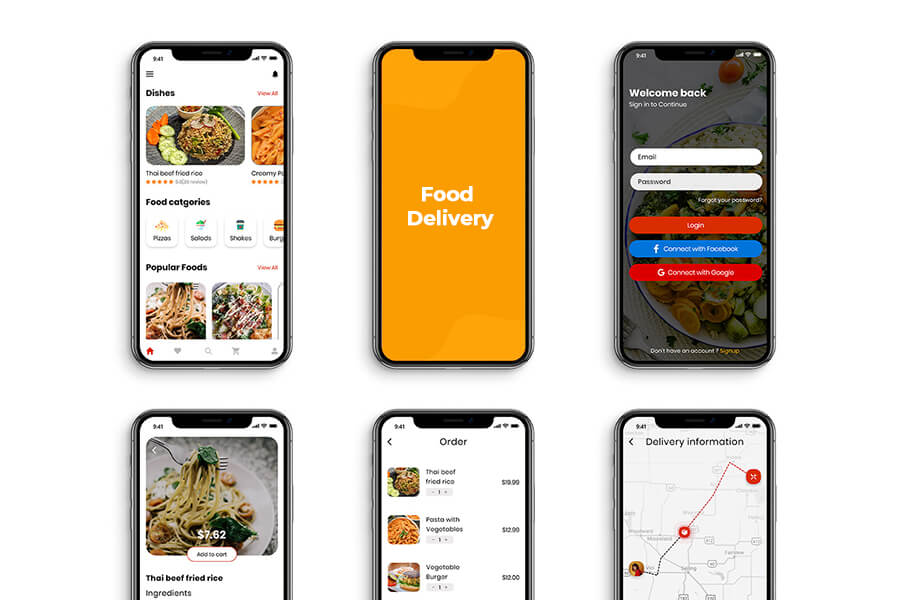
For today's users, this concept makes sense. If someone is hungry, they should be able to order food wherever they are. With apps like Swiggy, people can place orders in less time from their favourite restaurants so that they can get their favourite meals at the touch of a button. That is one of the reasons why food delivery apps are increasing in popularity.
The food delivery app is composed of the following components:
- User app
- Restaurant app
- Admin panel
- Driver app
User app
Registration/login
Log in or register using your email account, social media credentials, or phone number.
Search option
Users can search for their favourite food from nearby restaurants.
Offers
Users can access offers, discounts, and promo codes while placing an order to save money.
Order checkout
The selected items are added to the customers' carts, which are saved in their accounts and can be ordered at any time.
Multiple payments
Users can pay the order amount using various payment methods.
Swiggy wallet
The in-app wallet lets users quickly pay for orders.
Order tracking
Following the placement of the order, the user can track the order and find out when it will arrive.
Ratings
Restaurants and delivery personnel can be rated by users, and they can also share their experiences about the restaurant.
ustomer support
Customer support is available 24/7 for any questions about payments and orders.
Re-order
Customers can reorder their favourite food items by accessing their order history.
Order cancellation
Users have the option of cancelling an order if there is a mistake in the order or if it cannot be delivered to the desired location.
Add or update address
User can change their address or add a new address if they are delivering to a new location.
Add to favourite
Customers can add their liked food to favourites so that they can quickly order what they want.
Restaurant app
Time management
Restaurant owners can update and manage the operating hours of the restaurant through the app.
Menu management
They can also manage the list of items and their prices via the app.
Order management
Based on the location of the various customers, the restaurant owner will manage orders from the different customers and allocate them to the drivers.
Offers and discounts
Owners will be able to offer coupons and special offers to encourage customers to order food via the app.
Multiple payments
Provide different methods of payment for customers to choose from.
Admin panel
Content management
In the food delivery mobile app, admins can manage content from anywhere.
Category management
Admin can manage the category of different food items.
User management
Admins can manage all registered users.
Restaurant management
An admin can also manage the restaurants listed in the app.
Push messages
Customers are sent message alerts about recent offers, registrations, order details, etc.
Location tracking
The admin can send the user's orders to the driver and manage the locations.
Database backup
Administrators can store driver, customer, and restaurant info for future use.
Reports and analytics
Analysing business growth can be done by viewing usage reports.
Withdrawal requests
Admins can accept withdrawal requests from restaurants and refund payments.
Access order details
In the admin app, admins can see every order placed, detailed order information, and order status.
Driver app
Profile
On the driver app, drivers can save and update their personal information.
Order request
They can check orders and accept or decline delivery based on their convenience and availability.
Location tracking
Tracking the customer's location allows the driver to deliver the order to the customer in time.
Availability for service
During the order request process, drivers can additionally indicate whether or not they will be available.
Delivery information
It is possible for the driver to view the order information such as the order location, user name, etc.
Order history and payment info
Detailed information about previous orders and payments is also available to drivers.
Additional Features of Swiggy
With the increase in usage of on-demand delivery apps, Swiggy has introduced new features that allow users to access all services they may require through Swiggy. Instead of developing separate apps for different solutions, Swiggy acts as an umbrella solution for different services such as on-demand package delivery, and on-demand grocery delivery.
Swiggy Instamart
Swiggy has launched its latest project, Instamart, to facilitate the delivery of groceries and other necessities to customers. This is in response to the rise of internet orders, particularly for food and groceries.
Instamart is an online convenience store. From instant meals, ice cream, and snacks to fresh fruits and vegetables these virtual stores provide ultimate convenience to its users. These services are offered through Swiggy's dark stores, which are available exclusively online and through its hubs.
Swiggy Genie
From anywhere in your city, you can deliver or receive anything from Swiggy Genie, from lunch boxes to documents to laundry to shoes to stationery. It is also possible to purchase your supplies from nearby stores such as pharmacies, kirana stores, etc, simplifying your daily life. Additionally, you can opt for business deliveries if you own a business. As a result, you do not need to use the services of any other food delivery service but rather use your favourite app Swiggy instead.
Technology stack
Let's explore the various technical stacks that will help you to develop an amazing food delivery app like Swiggy.
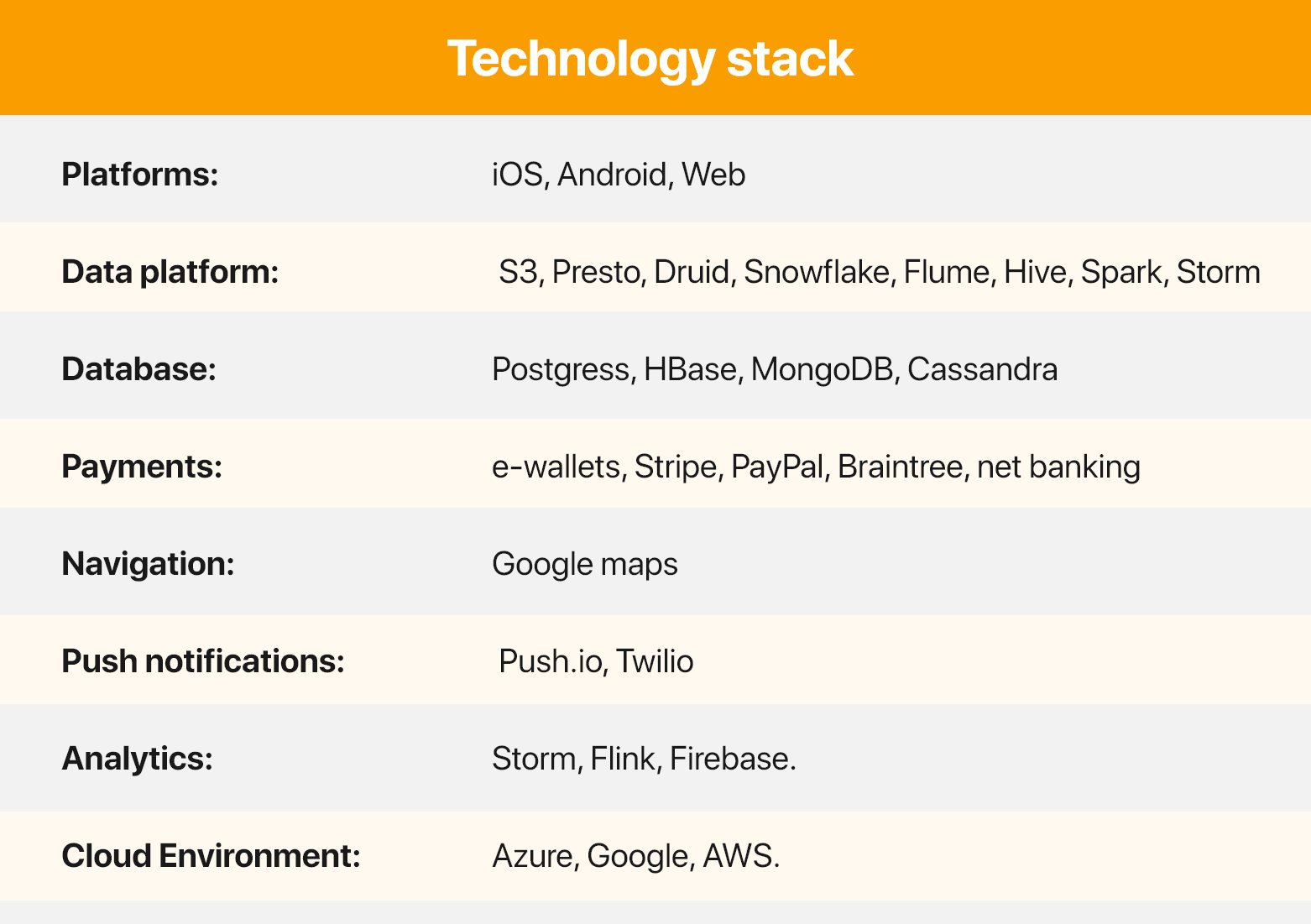
How does Swiggy generate money?
We will explore the different ways by which food delivery apps like Swiggy generate revenue.
Ads
A major source of revenue for a delivery app comes from advertising. Delivery apps charge restaurants to display ads or snippets about their businesses. In addition to the charge, the position of the ad on the app page is also taken into account.
Delivery charges
It can be quite challenging for restaurants that do not offer delivery services to serve customers. In exchange for providing delivery personnel to such food outlets, you can earn money.
Surge price
Demand surges when there is rain or another difficulty. Customers can be charged more for limited menu options in such situation. A higher delivery charge can also increase your app's revenue.
Fixed commission
Each order is billed with a fixed commission. Swiggy generates revenue with every order placed by a user and also enables the two parties to build a long-term relationship through this association.
Swiggy one
It is a program through which paid users can enjoy various benefits such as unlimited free delivery and other offers.
The Cost of Developing a Swiggy App
A mobile application's cost depends on its features and functionality. An app like Swiggy may cost more or less depending on the following factors:
- Number of platforms supported
- Technology stack
- The location where the app is developed
- Payment gateway integration
- Size of the development team
- Complexity of the application
Developing a basic mobile app for Swiggy starts from $10,000. Depending on your preferences and app functionalities, the development cost of an on-demand food delivery app can go up to $35,000. Our hourly development charge varies from $50 to $100.
For more information, get in touch with us. Our company can provide you with a detailed breakdown of the total development cost to help you evaluate whether your app is viable.
FAQs
What is the time taken to develop an app like Swiggy?
Several factors influence the time it takes to design and develop an app like Swiggy. These factors include the complexity of the design, the expertise of the developer, and the features required. Normally, it takes between 2 and 5 months.
How much does food delivery app development cost?
Costs for developing an app like Swiggy depend on many factors including the development platform, team location, app complexity, etc. A basic on-demand food delivery app may cost up to $35,000.
What is the revenue model of delivery apps like Swiggy and Zomato?
The most important source of revenue for Swiggy and Zomato are:
- Customer delivery fee
- Advertisements
- Surge fees
- Premium membership fees
- Delivery fee
- Cancellation fee, etc.
What is a Swiggy clone app?
Swiggy clone app is similar to Swiggy app and is pre-built with the features and functionalities necessary to provide fast and easy food ordering and delivery. The solution can be customized to meet your specific business model from start to finish.
Request a Quote
Categories
Popular posts
Best Practices for Software Product Engineering Every CTO Should Implement
2023-14-18How to Build Your Own On-Demand Carpooling App Services?
2023-08-25How to Start an On-Demand Fuel Delivery Business: A Comprehensive Guide
2023-07-28Empowering Miners: How Fleet Management Apps are Transforming the Mining Industry?
2023-07-21A Complete Guide to Develop a Food Delivery App for Restaurants in 2023
2023-07-08Mobile Apps Transforming the Travel Industry: A Game-Changer in Travel Planning and Experience
2023-07-07
